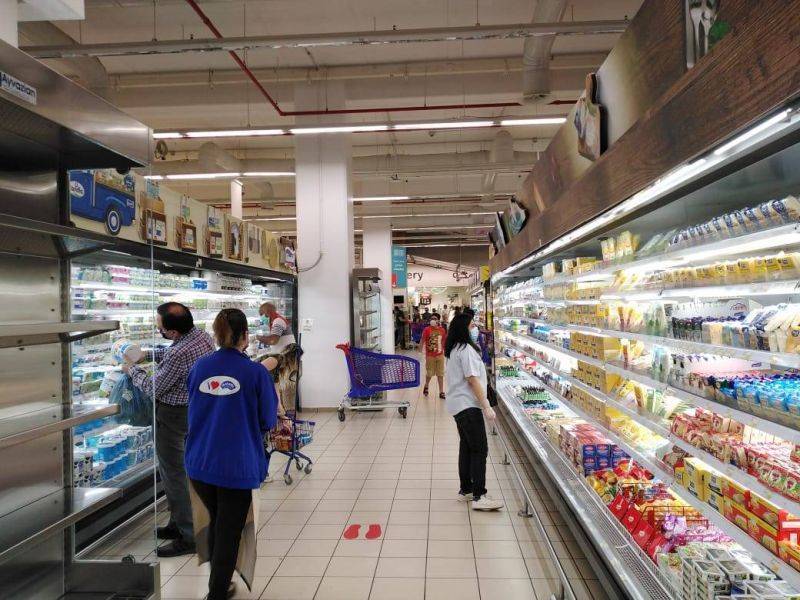
In the first half of July alone, the prices of basic food commodities needed by Lebanese families in Lebanon jumped by more than 50 percent, based on the Lebanon Crisis Observatory’s analysis of price tables from the Economy Ministry. (Credit: Céline Abboud)
BEIRUT — The average family of five now pays more than five times the minimum wage for a month’s worth of food, after the prices of basic food commodities increased more than 50 percent since the beginning of this month, according to the findings of a report released on Wednesday.
The report, from the American University of Beirut’s Lebanon Crisis Observatory, estimates the minimum cost of food for a family of five for a month at more than LL3.5 million, even as the monthly minimum wage has stagnated at LL675,000. The estimate does not include the cost of other basic home essentials such as water, gas and electricity.
The rapid rise in the prices of essential food items indicates that Lebanon is edging closer to hyperinflation. In the first half of July alone, the prices of basic food commodities needed by Lebanese families in Lebanon jumped by more than 50 percent, based on the observatory’s analysis of price tables from the Economy Ministry. Since July 2019, just before the onset of Lebanon’s economic crisis, the prices of 10 essential food commodities, including sugar, olive oil, tomatoes, and bananas, have increased by more than 700 percent, an analysis shows.
Indeed, Lebanon’s economic crisis and dizzying currency devaluation have sent prices soaring; the lira has lost more than 90 percent of its nominal value in the past two years. Based on the May consumer price index released by the Central Administration of Statistics, year-over-year prices had risen by more than 110 percent — the 11th straight month inflation had clocked in the triple digits.
“The inflation is expected to continue as the deterioration of the exchange rate of the Lebanese lira against the dollar keeps on taking place,” the report states.
According to Nasser Yassin, a policy and planning expert at AUB, who heads the observatory, “Based on the current prices, families in Lebanon would need constant financial support because any minimal food basket would cost a family of five ... around five times the minimum wage with the current prices.”
However, such assistance seems far off. Due to a series of administrative missteps on the part of Lebanese authorities, a $246 million World Bank loan aimed at getting cash quickly into the pockets of the most vulnerable Lebanese, has been delayed for months.
Meanwhile, a ration card law passed by Parliament that would see Lebanon’s poorest families receive an average of $93 a month is awaiting cabinet to iron out its implementation mechanisms. However, the country has been without an empowered government for almost a year, and the cabinet’s formation seems far off following Premier-designate Saad Hariri’s resignation last month after nine months of political infighting with President Michel Aoun.
At the same time, the central bank is gradually ending subsidies on key imports such as medicine and fuel, leading to price hikes in nearly all economic sectors.
“The absence of the political decision to deal responsibly with the Lebanese crisis, the suspicious slowness in launching the ration card, the scrutiny of developing a rescue and recovery plan and the continuous and rapid inflation will force Lebanon into following [Venezuela] into hyperinflation,” Yassin told L’Orient Today.
Nasser Saidi, a former economy and industry minister, warned that although the country has not yet crossed the hyperinflation threshold, salary stagnation, especially in the public sector, is likely to push it there. Workers in several sectors, including transportation, education and banking, have already held multiple strikes to protest worsening living conditions.
As the security forces and other public sector employees up their demands for a so-called cost-of-living adjustment, Saidi told L’Orient Today, “politicians and parliamentarians will want to placate pressure in the streets [and] vote for a [cost-of-living] adjustment, leading to an increase in government spending financed by printing money, which will then lead to hyperinflation. That is the looming, likely scenario.”